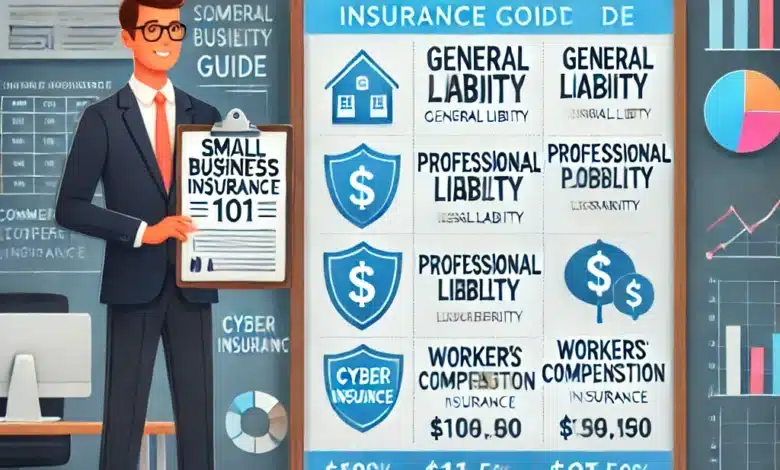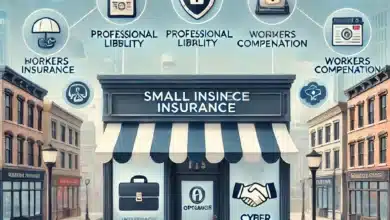Small Business Insurance 101: Types and Cost Considerations for Entrepreneurs

Introduction to Small Business Insurance
Starting a small business can be an exhilarating journey filled with dreams of success and independence. But along with that excitement comes the reality of risks and uncertainties. One crucial aspect every entrepreneurial venture should address is small business insurance. It’s not just about protecting your assets; it’s about safeguarding your vision for the future.
Imagine investing countless hours into building your brand, only to face unexpected challenges that could jeopardize everything you’ve worked for. That’s where comprehensive business insurance steps in, acting as a safety net to shield you from financial turmoil caused by accidents, lawsuits, or natural disasters.
Whether you’re a budding entrepreneur or have been navigating the waters of small business ownership for some time, understanding the types and costs associated with insurance coverage is essential. Let’s dive deeper into what small business insurance entails and how it can help fortify your enterprise against potential pitfalls.
Types of Small Business Insurance Coverage
Navigating the world of small business insurance can feel overwhelming. However, knowing the types available is crucial for entrepreneurs.
General liability insurance protects against claims of bodily injury or property damage. This coverage is essential, especially for businesses that interact directly with clients.
Property insurance safeguards your physical assets from risks like fire or theft. If you own a workspace or equipment, this type of policy is indispensable.
Professional liability insurance covers claims related to errors in provided services. For service-oriented businesses, this ensures you’re protected from lawsuits alleging negligence.
Workers’ compensation insurance is another vital component. It provides benefits to employees who may suffer work-related injuries or illnesses.
Business interruption insurance helps cover lost income due to unforeseen events halting operations. In today’s unpredictable environment, having this safety net can make all the difference for entrepreneurs.
Cost Considerations for Entrepreneurs
When it comes to small business insurance, understanding costs is crucial for entrepreneurs. Premiums can vary significantly based on several factors.
First, assess the type of coverage you need. General liability, property insurance, and workers’ compensation all come with different price tags. Each policy serves a unique purpose and should align with your business activities.
Location matters too. Businesses in high-risk areas may face higher premiums due to increased likelihood of claims.
Another factor is your industry sector. Certain industries are more prone to risks that insurers consider when calculating costs.
Don’t forget about deductibles. A higher deductible usually means lower premium payments but could lead to out-of-pocket expenses during a claim.
It’s wise to shop around for quotes from multiple providers before making decisions on policies or renewals. This ensures you’re getting the best value for your specific needs as an entrepreneur.
Choosing the Right Insurance Provider
Selecting the right insurance provider is crucial for your small business. Start by researching companies known for their reliability and customer service. Online reviews can provide valuable insights into how insurers treat their clients.
Consider the range of policies they offer. Some providers specialize in specific industries, which might be beneficial depending on your business type. Look for options that cater to your unique needs.
Don’t hesitate to ask for recommendations from fellow entrepreneurs or industry peers. Personal experiences often highlight strengths and weaknesses you may not find online.
Engage with potential providers directly. A conversation can reveal how responsive they are to inquiries and claims, which is vital when you need support most.
Compare quotes carefully, but remember that cost isn’t everything—quality coverage matters too. Prioritize finding a balance between affordability and comprehensive protection tailored to your enterprise.
Tips for Reducing Insurance Costs
Reducing insurance costs can significantly benefit your bottom line. Start by assessing your coverage needs. Only pay for what you truly need, avoiding unnecessary extras.
Consider bundling policies with one provider. Many insurers offer discounts when you combine business insurance plans like general liability and property coverage.
Regularly review your policy limits and deductibles. Increasing the deductible might lower premiums, but ensure it’s manageable in case of a claim.
Implement risk management practices in your business operations. Safer workplaces often lead to lower rates as they reduce the likelihood of claims.
Maintain a good credit score. Insurers frequently check credit history when determining rates, so keeping yours strong can help secure better deals on small business insurance.
Common Mistakes to Avoid with Small Business Insurance
A common mistake entrepreneurs make is underestimating their insurance needs. It’s tempting to think a basic policy is enough, but business risks can vary significantly.
Another pitfall is failing to review coverage regularly. As your business evolves, so do its risks and requirements. Neglecting to adjust policies can leave you exposed.
Many also overlook the fine print in their contracts. Understanding exclusions and limitations is crucial for effective protection.
Some entrepreneurs assume they have coverage simply because they operate from home or online. Homeowner’s insurance typically doesn’t cover business-related incidents.
Not shopping around for quotes can lead to overpaying for inadequate coverage. Taking the time to compare options often uncovers better deals tailored to your needs.
Conclusion
Securing the right small business insurance is essential for any entrepreneur. It shields your hard work from unexpected events that could derail your progress.
Understanding the various types of coverage available allows you to tailor a policy that meets your specific needs. This not only protects your assets but also gives you peace of mind as you navigate the challenges of running a business.
Cost factors play an important role too, influencing how much protection you can afford without stretching your budget too thin. By researching providers and exploring ways to cut costs, entrepreneurs can find sustainable solutions.
Mistakes in choosing or managing insurance coverage can lead to significant financial repercussions. Staying informed and proactive helps avoid these pitfalls while fostering growth and security for future endeavors.
FAQ
Navigating the world of small business insurance can be overwhelming for many entrepreneurs. Understanding the different types of coverage and associated costs is essential to protecting your investment. Here are some frequently asked questions that can help clarify common concerns.
What types of small business insurance do I need?
The coverage you need depends on your industry and specific risks. Common options include general liability, professional liability, property insurance, and workers’ compensation. Assessing your unique situation will guide you in selecting the right policies.
How much does small business insurance cost?
Costs vary widely based on factors like business size, location, industry type, and claims history. On average, entrepreneurs might expect to pay anywhere from a few hundred to several thousand dollars annually for comprehensive coverage.
Can I bundle my business insurance policies?
Yes! Many providers offer discounts when you bundle multiple policies into one package. This not only saves money but also simplifies managing your coverage.
Is it necessary to update my policy regularly?
Absolutely! As businesses grow or change direction, so too do their risks and needs. Regular reviews ensure that your policy remains relevant and adequately covers any new challenges faced by your enterprise.
Where can I find reliable information about different insurers?
Research online through trusted review platforms or consult with fellow entrepreneurs in networking groups. Additionally, working with an independent agent can provide insights tailored specifically to your needs.
By addressing these FAQs thoughtfully and strategically choosing the right coverages while keeping costs manageable, you position yourself for success as an entrepreneur navigating the complex landscape of small business insurance.





